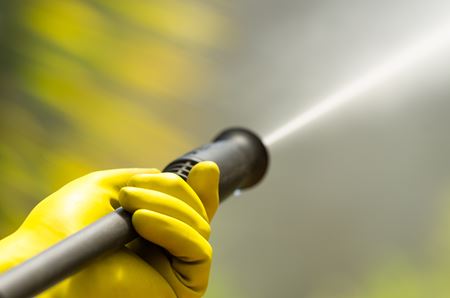Soft Washing vs. Pressure Washing

When it comes to cleaning the exterior of your home or business, two popular methods often come into play: soft washing and traditional power washing. While both techniques effectively remove dirt, grime, and other contaminants, they employ different approaches suited for various surfaces.
As consumers, we need to understand the nuances of these methods to determine the best option that fits our needs. This means making ourselves aware of some similarities and differences.
Temperature Of The Water
One of the primary differences between soft washing and traditional power washing is the temperature of the water used. Traditional power washing typically utilizes hot water, which can reach temperatures of up to 200°F. The heat helps break down stubborn dirt and grease, making it an effective method for tougher surfaces like concrete and brick. On the other hand, soft washing uses cooler water, usually at ambient temperatures.
This lower temperature is combined with specialized cleaning solutions that break down organic materials, such as mold, mildew, and algae. The gentle approach of soft washing helps prevent damage to delicate surfaces while still achieving a thorough clean.
Pressure Of The Water
The pressure at which the water is delivered is another key distinction between the two methods. Traditional power washing employs high pressure—often exceeding 3,000 PSI (pounds per square inch)—to blast away dirt and debris.
This high pressure is effective for tough surfaces but can be too harsh for more delicate materials, potentially causing damage. In contrast, soft washing operates at much lower pressures, usually between 50-200 PSI. This reduced pressure allows for a safe cleaning method on surfaces like roofs, siding, and painted surfaces, where high-pressure washing could lead to peeling paint or other damage.
By using the right pressure, we ensure that your property is cleaned effectively without the risk of harm.
Which Method Works Better On Specific Materials?
The choice between soft washing and traditional power washing often depends on the materials being cleaned. Traditional power washing is ideal for hard surfaces like driveways, sidewalks, and patios, where built-up grime, oil stains, or dirt need to be removed. It excels at cleaning materials such as concrete, brick, and stone.
On the other hand, soft washing is the preferred method for more delicate surfaces, including roofs, vinyl siding, and wooden decks. It effectively removes organic growth without causing harm, preserving the integrity and appearance of your materials.
House soft washing is another obvious treatment option, but don't be deceived: D-I-Y enthusiasts who rent a power washer and crank up the pressure thinking that will do the job might be unpleasantly surprised when the stream of water does more harm than good.
Ultimately, the right choice depends on your specific cleaning needs, and property owners should consider consulting a professional. Alpha Co. Enterprises, for instance, will assess each situation carefully to recommend the best method for achieving the desired results while ensuring the longevity of your surfaces. Give us a call at 262-899-5249.
Get Your Next Exterior Cleaning Project Started With Our Power Washing Specialists In New Berlin & Surrounding Areas!